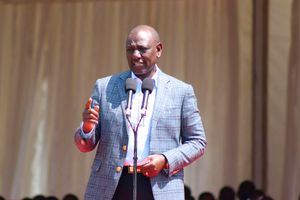
President William Ruto.
Last week, William Ruto posed a challenge: “If Ruto must go, tell me how you want me to go.” The statement was too clever by half, but also his most honest to date.
Article 146 of the Constitution provides three exits from the presidency: death, resignation and removal for incapacity or through impeachment. By the President’s reckoning, he is the one serving death on youth, and karma is unlikely to turn on him in the near future. He has barricaded the impeachment door by owning the National Assembly, thus leaving only one unthinkable option: resignation.
Resignation must, therefore, be made attractive by giving him an offer of a water-tight amnesty that is time bound. Although amnesty presents justice complications for families and survivors who have still not healed from the violations they have suffered, preventing more atrocities is probably worth the sacrifice.
Ruto has previously admitted to restraining himself from serving facial violence on his predecessor when Uhuru Kenyatta loudly considered throwing in the towel after the Supreme Court nullified the 2017 presidential election result. Resignation can appear inconceivable for those whose service in public office has crossed moral lines in a manner that invites accountability and consequences.
Legitimacy deficit
Ruto came to the presidency with a legitimacy deficit, supported by only a third of the 22 million registered voters in the 2022 election. Erstwhile government officials have catalogues of violations that subsist under this administration for which some form of reckoning is due. Each year since 2022, the government has been frontally challenged through strikes, protests and boycotts that only stoke irritation and anger, which tempt insiders to overreach.
Since persuasion, seduction and deception have repeatedly failed to make a mark, the State has resorted to outright violence, resulting in torture, abductions, and death. Death has become so commonplace in Kenya that youth routinely post their eulogies online in anticipation of deadly confrontations with security services during public protests.
Cost of living protests in 2023 claimed 75 lives at the hands of the police, for which the Azimio la Umoja coalition is seeking court-ordered compensation. Last year, anti-tax protests yielded an invoice of 63 deaths; and this year, some 16 lives were lost in the June 25 commemorative protests last week.
As the country marks the 35th anniversary of the Saba Saba demonstrations today, there is little hope that the confrontations that have bookmarked this administration will end. The Ruto administration’s attitude of infantilising the public evident in claims that protesters are being misled by political leaders — as if they have no agency of their own — and mislabelling 18 million young people as goons who need to be hemmed in by bullets, teargas and barbed razor wire does nothing to blunt the unmet demands they have made on this administration.
Last year, protesters who were disinterested in political power demanded halving the size of administration to reduce costs; Ruto increased the number of principal secretaries by 14.
They demanded the scrapping of illegal and illegitimate positions, and funding for the Office of the First Lady, Second Lady, and Prime Cabinet Secretary’s Spouse. The State House renovations budget expanded, and Ruto assembled some 20 advisers who are regularly giving him bad advice despite promising to halve their number.
Protesters called for the dismissal of all government officials with criminal records and integrity issues. The demand fell on deaf ears.
Bad manners
After a brief period of shame and contrition over conspicuous consumption and bad manners through money laundering, and purchasing public adoration through donations at religious events, funerals, and weddings, the practice is back in vogue.
Demands to constitute the IEBC and employ junior school teachers as well as intern doctors have been partially met.
Audit national Debt
Last week, Ruto was in London, after another 14 international trips since June last year. The suspension of non-essential travel by State and public officers, as well as the purchase of new government vehicles, was a Pyrrhic victory.
The task force to audit national debt — a duty constitutionally assigned to the Auditor-General —was dead on arrival, and the administration continues to power on in implementing the Social Health Insurance scheme as well as the housing levy.
Police have been preoccupied with managing protests more than addressing citizens’ security issues, resulting in hundreds of deaths and thousands of injuries. The refusal to pay compensation for those injured and killed in protests — a codicil to the original demands — communicates a continuing posture of arrogance and determination to perpetuate and defend impunity.
Last week, Ruto infamously said: “If there is no Kenya for Ruto, there will be no Kenya for you.”
This then is the dividing line: the President believes he will abuse violence as a tool for negotiation. But this could trigger violent responses, such as was seen in the torching of 10 police stations last week.
Prof Peter Kagwanja has famously said that no older generation has ever defeated its youth. Its free advice the president should heed. We have reached that moment where it is more expensive for President Ruto to complete his term than to receive his full pension and leave Kenya alone.
Criminality
Since coming to office, the Ruto presidency has been suffused in criminality. Some of it has been halted by the courts, but much more are crimes in progress that fall outside the margins of accountability because of constitutional immunity to the president.
The self-serving but suboptimal management of the economy, characterised by dodgy deals for airport expansion, electricity transmission, roads infrastructure, affordable housing and social health insurance is bathed in the pong of corruption. It is not the petty kind of venality that can be overlooked because of its scale and impact on large numbers of citizens. The way out is to leave quietly, with no charges pursued.
The writer is a board member of the Kenya Human Rights Commission and writes in his individual capacity. @kwamchetsi; [email protected]







